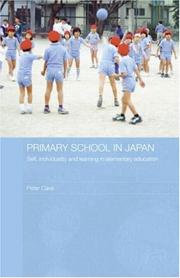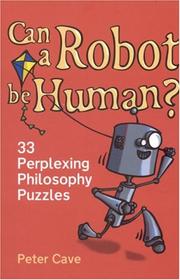| Listing 1 - 10 of 12 | << page >> |
Sort by
|

ISBN: 9781847062208 9781847062192 Year: 2009 Publisher: London Continuum
Abstract | Keywords | Export | Availability | Bookmark
 Loading...
Loading...Choose an application
- Reference Manager
- EndNote
- RefWorks (Direct export to RefWorks)
Philosophy --- Critical thinking. --- Logic. --- Paradox. --- Reasoning.

ISBN: 9780415446792 0415446791 9780415545365 0415545366 9780203935811 0203935810 9781134064045 9781134064083 9781134064090 Year: 2007 Publisher: London : Routledge,
Abstract | Keywords | Export | Availability | Bookmark
 Loading...
Loading...Choose an application
- Reference Manager
- EndNote
- RefWorks (Direct export to RefWorks)
The balance between individual independence and social interdependence is a perennial debate in Japan. This book, based on an extended, detailed study of two primary schools in the Kinki district of Japan, discusses these debates.
Education, Elementary --- -Japanese --- -Individuality in children --- -Child development --- -J4955 --- J4935 --- J4173 --- J4127 --- Child study --- Children --- Development, Child --- Developmental biology --- Developmental psychobiology --- Child rearing --- Child psychology --- Ethnology --- Elementary education --- Primary education (Great Britain) --- School children --- Education --- Education (Elementary) --- Japan: Education -- preschool, kindergartens and elementary education --- Japan: Education -- educational psychology and sociology --- Japan: Sociology and anthropology -- family and interpersonal relations -- children, parent-child relations, child raising, family planning --- Japan: Sociology and anthropology -- social identity and self --- Development --- Japanese --- Individuality in children --- Grundschulunterricht. --- Education (Elementary). --- Child development --- J4955 --- Individualität. --- Kind. --- Japan. --- Politique et éducation --- Lecture --- Mathématiques --- Éducation et État --- Enseignement --- Éducation --- Enseignement primaire --- Développement de la personnalité --- Enfants --- Japon --- Étude et enseignement (primaire) --- Étude et enseignement --- Développement

ISBN: 9781851685318 Year: 2008 Publisher: Oxford : Oneworld,
Abstract | Keywords | Export | Availability | Bookmark
 Loading...
Loading...Choose an application
- Reference Manager
- EndNote
- RefWorks (Direct export to RefWorks)
Book
ISBN: 9781851686209 Year: 2008 Publisher: Oxford : Oneworld,
Abstract | Keywords | Export | Availability | Bookmark
 Loading...
Loading...Choose an application
- Reference Manager
- EndNote
- RefWorks (Direct export to RefWorks)
Book
ISBN: 022636805X 9780226368054 9780226367729 022636772X 9780226367866 022636786X Year: 2016 Publisher: Chicago London
Abstract | Keywords | Export | Availability | Bookmark
 Loading...
Loading...Choose an application
- Reference Manager
- EndNote
- RefWorks (Direct export to RefWorks)
Balancing the development of autonomy with that of social interdependence is a crucial aim of education in any society, but nowhere has it been more hotly debated than in Japan, where controversial education reforms over the past twenty years have attempted to reconcile the two goals.
Junior high schools --- Japanese --- Educational change --- Social aspects --- Education (Elementary) --- education, japan, autonomy, interdependence, independence, reform, junior high, entrance exams, testing, pressure, culture, free thinking, pedagogy, curricula, social integration, individuality, conformity, self, community, school, nonfiction, cross cultural, sociology, elementary, discipline, classes, clubs, control, games, expression, language, literature, juku, graduation, students, teachers.
Book
ISBN: 9780226367729 022636772X 9780226367866 022636786X Year: 2016 Publisher: Chicago University of Chicago Press
Abstract | Keywords | Export | Availability | Bookmark
 Loading...
Loading...Choose an application
- Reference Manager
- EndNote
- RefWorks (Direct export to RefWorks)
Balancing the development of autonomy with that of social interdependence is a crucial aim of education in any society, but nowhere has it been more hotly debated than in Japan, where controversial education reforms over the past twenty years have attempted to reconcile the two goals.
Junior high schools --- Japanese --- Educational change --- Social aspects --- Education (Elementary)
Book
Abstract | Keywords | Export | Availability | Bookmark
 Loading...
Loading...Choose an application
- Reference Manager
- EndNote
- RefWorks (Direct export to RefWorks)
Book
ISBN: 9780367334062 0367334062 9780367334178 0367334178 9780429319730 Year: 2020 Publisher: Abingdon Routledge
Abstract | Keywords | Export | Availability | Bookmark
 Loading...
Loading...Choose an application
- Reference Manager
- EndNote
- RefWorks (Direct export to RefWorks)
"Arguing About Judaism differs from other introductions to Judaism. It is unique, not solely in its engaging dialogues between a Reform rabbi and a humanist and atheist philosopher, but also in its presentation of and challenges to the fundamental religious beliefs of the Jewish heritage and their relevance to today's Jewish community. The dialogues contain both Jewish narratives and philosophical responses, with topics ranging from the nature of God to controversies over sexual relations, animal welfare and the environment - from antisemitism to the State of Israel and Zionism. Although the rabbi and philosopher argue strongly, clearly enjoying the cut and thrust of debate, they do so with sensitivity, charm and respect, revealing the rich intricacies of the Jewish religion and contemporary Jewish life. While essential reading for those studying Judaism and Jewish history, the book aims to stimulate debate more generally amongst Jews and non-Jews, the religious and the atheist - all those with a general interest in religion and philosophy"--
Judaism --- Atheism --- Reform Judaism --- Philosophy
Book

ISBN: 0824868897 082483870X 9780824838706 0824838688 Year: 2014 Publisher: Honolulu
Abstract | Keywords | Export | Availability | Bookmark
 Loading...
Loading...Choose an application
- Reference Manager
- EndNote
- RefWorks (Direct export to RefWorks)
What are people's life experiences in present-day Japan? This timely volume addresses fundamental questions vital to understanding Japan in the first decade of the twenty-first century. Its chapters collectively reveal a questioning of middle-class ideals once considered the essence of Japaneseness. In the postwar model household a man was expected to obtain a job at a major firm that offered life-long employment; his counterpart, the "professional" housewife, managed the domestic sphere and the children, who were educated in a system that provided a path to mainstream success. In the past twenty years, however, Japanese society has seen a sharp increase in precarious forms of employment, higher divorce rates, and a widening gap between haves and have-nots. Contributors draw on rich, nuanced fieldwork data collected during the 2000s to examine work, schooling, family and marital relations, child rearing, entertainment, lifestyle choices, community support, consumption and waste, material culture, well-being, aging, death and memorial rites, and sexuality. The voices in these pages vary widely: They include schoolchildren, teenagers, career women, unmarried women, young mothers, people with disabilities, small business owners, organic farmers, retirees, and the elderly.
SOCIAL SCIENCE / Anthropology / Cultural & Social. --- Japan --- al-Yābān --- Giappone --- Government of Japan --- Iapōnia --- I︠A︡ponii︠a︡ --- Japam --- Japani --- Japão --- Japon --- Japonia --- Japonsko --- Japonya --- Jih-pen --- Mư̄ang Yīpun --- Nihon --- Nihon-koku --- Nihonkoku --- Nippon --- Nippon-koku --- Nipponkoku --- Prathēt Yīpun --- Riben --- State of Japan --- Yābān --- Yapan --- Yīpun --- Zhāpān --- Япония --- اليابان --- يابان --- 日本 --- 日本国 --- Social conditions --- Economic conditions --- Jepun --- Yapon --- Yapon Ulus --- I︠A︡pon --- Япон --- I︠A︡pon Uls --- Япон Улс
Digital

ISBN: 9780824838706 9780824838683 Year: 2014 Publisher: Honolulu, Hawaii University of Hawaii Press
Abstract | Keywords | Export | Availability | Bookmark
 Loading...
Loading...Choose an application
- Reference Manager
- EndNote
- RefWorks (Direct export to RefWorks)
| Listing 1 - 10 of 12 | << page >> |
Sort by
|

 Search
Search Feedback
Feedback About UniCat
About UniCat  Help
Help News
News